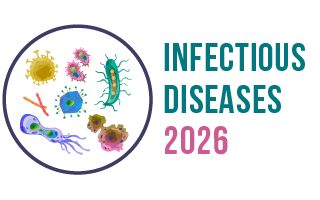4th International Conference on
Infectious Diseases
September 09-10, 2026 | Barcelona, Spain

Infectious Diseases 2026

National Institute of Health, Colombia
Abstract:
This study examines the temporal and spatial distribution and epidemiological behavior of Plasmodium vivax malaria in Colombia from 2000 to 2023. Although global cases of P. vivax have decreased, this disease remains a significant challenge in the Americas, particularly in Colombia, due to its recurrent nature and widespread distribution. A comprehensive time-series study was conducted using official secondary data on malaria-associated morbidity and mortality. Temporal-spatial and population variables were analyzed, and the absolute and relative frequency measures of general and regional morbidity and mortality were estimated. Over the study period, Colombia reported 2,193,233 malaria cases, with P. vivax accounting for 60.1% (1,318,820 cases). Males were the most affected (62.9%), with the 15- 29 years (36.7%) and 5-14 years (22.9%) age groups being particularly vulnerable. The Uraba-Bajo Cauca- Sinu-San Jorge region showed the highest prevalence (51.1%). Despite an overall decrease in cases, there was an increase in severe complications, mortality, and recurrences. Hematological complications represented 68% of severe cases, and there were 327,067 recurrence episodes, with a recurrence rate of 24.8%. Epidemics were identified in 2001, 2002, 2004, 2007, 2010, and 2023, indicating a cyclical pattern. These findings highlight the ongoing challenges in managing and controlling P. vivax malaria in Colombia, emphasizing the need for improved strategies to address these issues.
Biography:
Physician with extensive experience and a strong focus on epidemiology. His research integrates statistical, economic, and epidemiological methods to explore the distribution, risk factors, and determinants of infectious tropical diseases, with a particular emphasis on vector-borne illnesses such as Chagas disease, leishmaniasis, and malaria. His work aims to inform disease control strategies and health event management.
